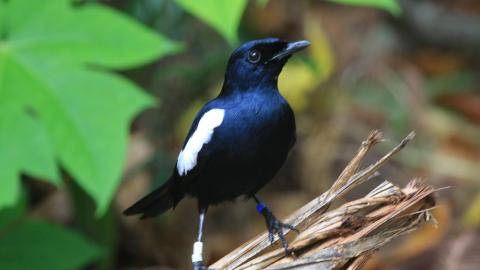Meet the world’s first ‘digital species’ for conservation

Adrian Scottow from London, England (via Wikicommons)
The Seychelles magpie-robin is up for sale as a digital nature collectible in an innovative campaign to raise funds for conservation efforts to save the endangered bird.
The world’s first digital species was launched by Nature Seychelles, supported by its international partners, the International Union for Conservation for Nature and the Porini Foundation.
The bird is being offered as a limited-edition non-fungible token (NFT) – a one-of-a-kind piece of digital content linked to an image or video – meaning that only 59 ‘digital twins’ of the endangered species will be released for purchase.
“The Seychelles magpie-robin will take us into the uncharted waters of digital tokens for conservation, with a limited edition of the first 59 collectables – representing a ‘digital twin of this endangered living bird,” said Nature Seychelles CEO Dr Nirmal Shah.
“As traditional sources of funding have dried up, we need innovative ways to support long-term programmes that are the backbone of successful conservation. This is just the beginning of experiments to find new income streams for conservation.”
Seychelles magpie-robin listed as Endangered
The Seychelles magpie-robin, or Pi-Santez in Creole, is a glossy black and white bird with a black bill and long tail that lives on the islands of Fregate, Cousin, Cousine, Denis and Aride.
The creature, whose scientific name is Copsychus sechellarum, is listed as Endangered due to its low population of about 460 birds on the Indian Ocean archipelago, with 59 on the Cousin Island Special Reserve.
However, the Seychelles magpie-robin was downgraded from Critically Endangered in 2005 as numbers increased following intensive conservation efforts.
Conservation saw bird’s population grow
Much of this population growth is due to the Seychelles Magpie Robin Recovery Team, which was set up in 1990 when there were only 23 birds on one island.
The early days of the programme, which was first run by Birdlife and the Royal Society for Protection of Birds before being passed to Nature Seychelles in 1998, was focused on stabilizing and recovering the last population on Fregate Island.
Once numbers stabilized and increased, the Seychelles magpie-robin population was re-established on the islands of Cousin, Cousine and Aride.
Since 2004, all islands that are home to the birds have taken overall management responsibility for their own populations, and decisions are agreed by a local team of stakeholders along with the Ministry of Environment and Nature Seychelles.
NFTs to boost conservation funds post-pandemic
Nature Seychelles, like other conservation groups, saw usual sources of income such as tourism dry up during the pandemic, leading them to turn to blockchain to boost fundraising.
Each of the Seychelles magpie-robin NFTs – whose authenticity is confirmed by blockchain, meaning it can’t be duplicated or manipulated – is a representation of a living bird currently protected on the Seychelles’ Cousin Island Special Reserve.
They can be purchased for as little as $10 or up to $10,000, with the organization raising $2,500 on the first day of sale alone.
“You can contribute whatever you want, and the money will go directly to us to help manage this species,” Shah told AFP. “This is just the beginning of experiments to find new income streams for conservation.”
Conservation vital for Earth’s biodiversity
Conserving species of all kinds is vital in maintaining the Earth’s biodiversity, which is the variety of life on the planet in all of its forms and interactions.
Each of these species and organisms work together to maintain balance and support life, so a rich biodiversity indicates a healthy ecosystem – which is beneficial both for the environment and humankind.
One million species are currently thought to be at risk of extinction with nature declining at rates unprecedented in history, according to a 2019 UN report.
Reprinted with permission of the World Economic Forum. Read the original article.





